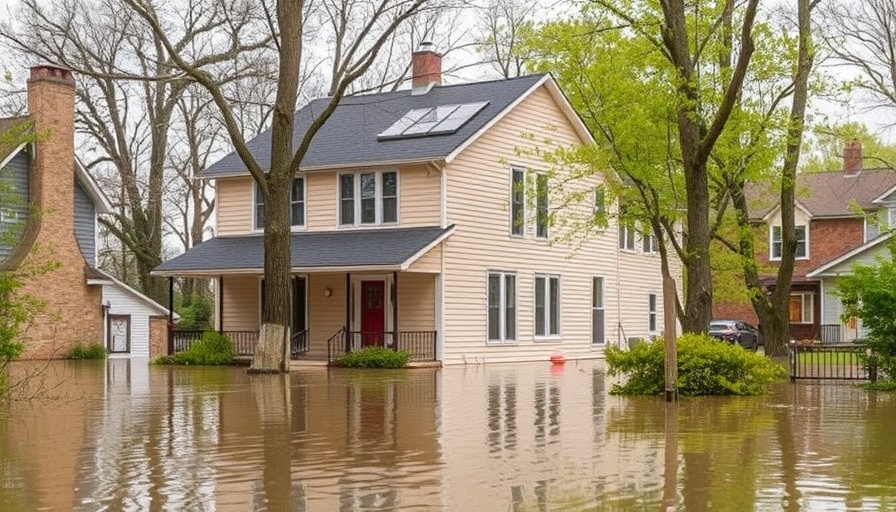
Understanding Flood Damage Claims: A Necessity for Homeowners
When it comes to flood damage claims in Wisconsin, there’s much to consider, particularly for homeowners navigating through the complexities of their insurance policy. Flooding is not just a seasonal occurrence; it can happen unexpectedly at any time, leaving homeowners scrambling to assess damages and file claims accurately. Understanding the intricacies of this claims process can save both time and money.
The Claims Process: Step by Step
The first step in filing an insurance claim for flood damage is to document the damage thoroughly. Taking clear photographs and detailed notes of impacted areas helps build a strong case with your insurance adjuster, who will evaluate the damages as part of the claims process.
Next, reach out to your insurance company right away. Many contracts impose deadlines for submitting claims, emphasizing the importance of timely action. After contacting them, you should receive guidance on how to fill out a claim application, as well as instructions for dealing with adjusters, who assess the property and determine the extent of your insurance coverage.
Wisconsin's Unique Insurance Landscape
Wisconsin homeowners must also keep in mind that standard homeowner policies typically do not include flood insurance, which means it's crucial to have a separate flood insurance policy provided by FEMA or another insurance provider. Being aware of these nuances can be pivotal for homeowners, as navigating potential denied insurance claims can delay repairs and extend recovery time.
Common Pitfalls in the Claims Process
While many homeowners assume that their insurance claims will be straightforward, the reality is often quite different. Many face complications, especially when it comes to negotiating settlements. A clear communication channel must be maintained with your insurance adjuster, and it's essential to understand how to negotiate claims and respond to low initial settlement offers effectively.
For example, insurers may overlook damages that are not immediately apparent, or they may underestimate costs for repairs. Being prepared to present counter-evidence, such as contractor estimates or additional documentation proving your loss, is essential.
Negotiating the Best Settlement: Tips for Power
Once you file your property damage claim, await the adjuster's review and assessment. It's advisable to be patient, as claims can take time—sometimes weeks or even months—to process. However, if your claim is denied or settled for an amount less than expected, don’t be disheartened. Denied claims can often be appealed, and engaging an attorney versed in property damage claims can help in crafting a robust response.
Furthermore, exploring the possibility of obtaining a second opinion or an independent assessment can lend weight to your negotiations. Engaging professionals who specialize in flood damage can be key to ensuring that all damages are accounted for and that the recovery process is swift and effective.
Real Stories: Impact of Flood Damage on Homeowners
To illustrate the importance of understanding flood damage claims, consider the story of Mike, a Wisconsin homeowner who experienced extensive flooding when a nearby river overflowed its banks. Initially, Mike assumed his homeowner’s policy would cover the damage. Unfortunately, he learned that he had no flood insurance and subsequently faced a challenging path to mitigate his damages.
His experience highlights how crucial it is to be aware of your policy details and adjust accordingly, especially in a region prone to flooding. If you’re in a similar position, Mike's story serves as a reminder to assess your own insurance coverage proactively.
Future Trends: Preparing for the Unexpected
Wisconsin is likely to experience increased weather volatility, making robust flood insurance coverage more important than ever. As climate patterns change, staying informed about insurance adjustments and potential coverage expansions can wield a major advantage in crucial times.
Engaging with local experts and participating in community discussions can provide invaluable insights into the future of flood insurance and assist in navigating potential claims processes.
In conclusion, knowing how to navigate flood damage claims can significantly ease the burden when disaster strikes. From filing an insurance claim to negotiating settlements, it’s essential for homeowners to educate themselves and seek support where needed. Don’t wait until the water is rising—seek clarity on your insurance options today. It may save you time and heartache in trying circumstances.
 Add Row
Add Row  Add
Add 




Write A Comment